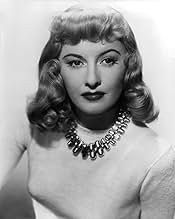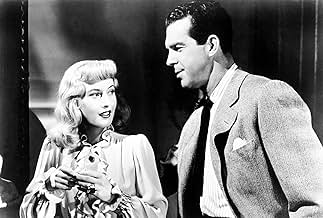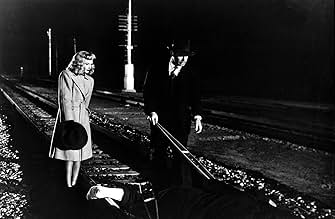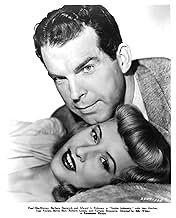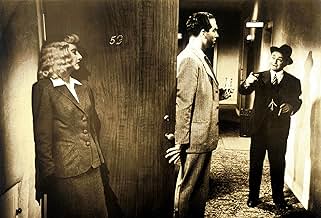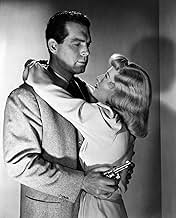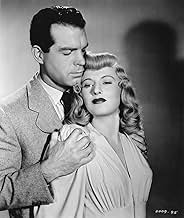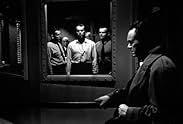An insurance representative is seduced by a dissatisfied housewife into a scheme of insurance fraud and murder that arouses the suspicion of his colleague, a claims investigator.An insurance representative is seduced by a dissatisfied housewife into a scheme of insurance fraud and murder that arouses the suspicion of his colleague, a claims investigator.An insurance representative is seduced by a dissatisfied housewife into a scheme of insurance fraud and murder that arouses the suspicion of his colleague, a claims investigator.
- Director
- Writers
- Stars
- Nominated for 7 Oscars
- 5 wins & 9 nominations total
- Stage Hand
- (uncredited)
- Pullman Porter
- (uncredited)
- Bit Part
- (uncredited)
- Train Conductor
- (uncredited)
- Conductor
- (uncredited)
- Nettie - Dietrichsons' Maid
- (uncredited)
- Norton's Secretary
- (uncredited)
- Director
- Writers
- All cast & crew
- Production, box office & more at IMDbPro
Summary
Featured reviews
Like POSTMAN, INDEMNITY offers the story of a married woman who plots with her lover to murder her husband. Given MacMurray's typically "good guy" image, I didn't expect to believe him in the role of Walter Neff in the role of skirt-hungry Walter Neff--but MacMurray's performance is exceptionally good here, and all the more effective because it so completely unexpected. But while MacMurray has most of the screen time, it is really Stanwyck and Edward G. Robinson who dominate the film. Stanwyck is truly memorable here, and gives us a woman who seems at once sexed-up and completely frigid, at once completely natural and absolutely artificial. It is a remarkable and often disturbing effect. Robinson, who endured decades of type-casting, is equally good as the blustery, slightly comic, and absolutely honest insurance man whose job it is to ferret out suspicious claims; it is largely due to his performance, which gives the film a moral center, that we are able to buy into the otherwise off-beat performances that drive the action.
This was one of director Billy Wilder's first major hits, and he deserves considerable credit for making the weird elements of the story work as a whole, keeping the film smartly paced, and heaping it up with atmosphere. So influential that its impact would be difficult to over-estimate, DOUBLE INDEMNITY is a touchstone for the entire film noir genre. Recommended.
Gary F. Taylor, aka GFT, Amazon Reviewer
Woman and man agree to murder woman's husband but on the way to the cemetery they face grilling by insurance company. I think everything has been said before on the IMDb - by those who think it's one of the best films ever made! To those who simply think the main problem is that it's dated I wish you could see the TV commercials that dug into DI back in '87 - what a hoot - and compare. I've just noticed the print TCM UK is showing in 2005 is lip-synced out, very wobbly Rosza music track, fading and ageing fast - worse than my 1987 video tape (maybe logically). They're supposed to be encouraging people to enjoy the classics but they won't do that with such inferior screening copies. Dear TCM UK, this is an impressive iconic film - it deserves a billion dollar remaster authorised by the Library of Congress, not repeatedly trotting out unimpressive cheap worn dupes to fill those 2 hour slots.
Everything about DI from the acting, production, direction, and music is superbly dignified and is as "close to perfection" as human beings are probably allowed to get with this form of Art - especially with the more limited technology at their disposal in '44. When most films from now are long forgotten and dated DI will still be getting re-runs on TV and art-house cinemas - God and remasters willing - that is the fact of it.
Fortunia Bonanova certainly was fortunate to have appeared in bit parts in 2 of the best films ever made - Citizen Kane the other.
Barbara Stanwyck, in one of the most remembered performances of her extensive career, represents (with nearly flawless ease) the cold and ruthless manipulator who has no difficulty in ruining other people's lives in various ways (including death, if necessary) in order to get what she wants. Known in the film community as the `femme fatale,' this is someone who uses her sexual prowess, seductiveness, and emotional detachment to drag an unsuspecting person (generally an interested man) into a scheme from which she is expected to benefit heavily and he is most likely headed for destruction. In these types of films, the man often either finds his life in ruins or ends up dead, as is often (but not always) also the case with the fate of the femme fatale.
Barbara Stanwyck (as Phyllis Dietrichson, the murderous femme fatale in Double Indemnity) and Fred MacMurray (as Walter Neff, her victim'), have amazing chemistry on screen. Their attraction is incredibly well portrayed, and the development of their relationship with each other is so convincing that what happens between them almost seems normal. Besides that, their mutually calculated interaction, although it seems at first like it has been rehearsed endlessly and ultimately brought unconvincingly to the screen, is exactly as it was meant to be, because it represents each character's intentions, even very subtly foreshadowing their future betrayals against each other. Phyllis has gone through every word she ever says to Walter in her head. She has practiced what she wants to say when she brings up the idea of life insurance to Walter in the beginning and she knows what she wants to say whenever they interact with each other because she has been planning for quite some time the prospect of murdering her husband in order to collect his fortune. Walter, conversely, methodically makes amorous advances as though this is something that he does regularly, and then ultimately he also plans out his conversations with Phyllis because he begins to suspect her and is sure to tell her only what he wants her to hear. This seemingly stiff dialogue brilliantly represents Phyllis and Walter's precise (and sinister) intentions, and it's quick pace creates a feeling of urgency and restlessness.
Probably the most fascinating and entertaining actor in the film, Edward G. Robinson, plays Barton Keyes, Walter's friend and employer at the insurance company where he works. Keyes is a very suspicious man who closely investigates the insurance claims which come into the company, having a striking history of accurately isolating fraudulent claims and throwing them out. His handling of Phyllis's (and Walter's, technically) claim and the way that he gets closer and closer to the truth create a great atmosphere of tension and drama.
Double Indemnity is nearly flawless. From the shocking and unexpected beginning to the already known but still surprising end, the audience is held rapt by the excellent performances, the brilliant and imaginative direction, and the flawlessly created atmosphere. This is excellent, excellent filmmaking, and is a classic film that should not be missed.
Did you know
- TriviaAuthor James M. Cain later admitted that if he had come up with some of the solutions to the plot that screenwriters Billy Wilder and Raymond Chandler did, he would have employed them in his original novel.
- GoofsWhen Walter first kisses Phyllis, a wedding ring can be seen on Walter's hand. Fred MacMurray was married, and the ring was not noticed until post-production.
- Quotes
[last lines]
Walter Neff: Know why you couldn't figure this one, Keyes? I'll tell ya. 'Cause the guy you were looking for was too close. Right across the desk from ya.
Barton Keyes: Closer than that, Walter.
Walter Neff: I love you, too.
- Crazy creditsOpening credits are shown over a silhouette of a man on crutches, walking toward the camera.
- ConnectionsEdited into Les cadavres ne portent pas de costard (1982)
Details
- Release date
- Country of origin
- Official site
- Language
- Also known as
- Pacto de sangre
- Filming locations
- 6301 Quebec Drive, Hollywood Hills, Los Angeles, California, USA(Dietrichson house)
- Production company
- See more company credits at IMDbPro
Box office
- Budget
- $927,262 (estimated)
- Gross worldwide
- $21,026
- Runtime1 hour 47 minutes
- Color
- Aspect ratio
- 1.37 : 1
Contribute to this page




